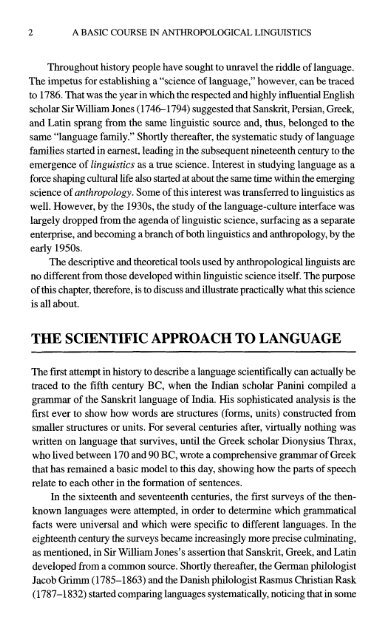A Basic Course in Anthropological Linguistics (Studies in Linguistic ...
A Basic Course in Anthropological Linguistics (Studies in Linguistic ...
A Basic Course in Anthropological Linguistics (Studies in Linguistic ...
Create successful ePaper yourself
Turn your PDF publications into a flip-book with our unique Google optimized e-Paper software.
2 A BASIC COURSE IN ANTHROPOLOGICAL LINGUISTICS<br />
Throughout history people have sought to unravel the riddle of language.<br />
The impetus for establish<strong>in</strong>g a “science of language,” however, can be traced<br />
to 1786. That was the year <strong>in</strong> which the respected and highly <strong>in</strong>fluential English<br />
scholar Sir William Jones (1746-1794) suggested that Sanskrit, Persian, Greek,<br />
and Lat<strong>in</strong> sprang from the same l<strong>in</strong>guistic source and, thus, belonged to the<br />
same “language family.” Shortly thereafter, the systematic study of language<br />
families started <strong>in</strong> earnest, lead<strong>in</strong>g <strong>in</strong> the subsequent n<strong>in</strong>eteenth century to the<br />
emergence of l<strong>in</strong>guistics as a true science. Interest <strong>in</strong> study<strong>in</strong>g language as a<br />
force shap<strong>in</strong>g cultural Me also started at about the same time with<strong>in</strong> the emerg<strong>in</strong>g<br />
science of anthropology. Some of this <strong>in</strong>terest was transferred to l<strong>in</strong>guistics as<br />
well. However, by the 1930s, the study of the language-culture <strong>in</strong>terface was<br />
largely dropped from the agenda of l<strong>in</strong>guistic science, surfac<strong>in</strong>g as a separate<br />
enterprise, and becom<strong>in</strong>g a branch of both l<strong>in</strong>guistics and anthropology, by the<br />
early 1950s.<br />
The descriptive and theoretical tools used by anthropological l<strong>in</strong>guists are<br />
no different from those developed with<strong>in</strong> l<strong>in</strong>guistic science itself. The purpose<br />
of this chapter, therefore, is to discuss and illustrate practically what this science<br />
is all about.<br />
THE SCIENTIFIC APPROACH TO LANGUAGE<br />
The first attempt <strong>in</strong> history to describe a language scientifically can actually be<br />
traced to the fifth century BC, when the Indian scholar Pan<strong>in</strong>i compiled a<br />
grammar of the Sanskrit language of India. His sophsticated analysis is the<br />
first ever to show how words are structures (forms, units) constructed from<br />
smaller structures or units. For several centuries after, virtually nothmg was<br />
written on language that survives, until the Greek scholar Dionysius Thrax,<br />
who lived between 170 and 90 BC, wrote a comprehensive grammar of Greek<br />
that has rema<strong>in</strong>ed a basic model to this day, show<strong>in</strong>g how the parts of speech<br />
relate to each other <strong>in</strong> the formation of sentences.<br />
In the sixteenth and seventeenth centuries, the first surveys of the then-<br />
known languages were attempted, <strong>in</strong> order to determ<strong>in</strong>e which grammatical<br />
facts were universal and which were specific to different languages. In the<br />
eighteenth century the surveys became <strong>in</strong>creas<strong>in</strong>gly more precise culm<strong>in</strong>at<strong>in</strong>g,<br />
as mentioned, <strong>in</strong> Sir William Jones’s assertion that Sanskrit, Greek, and Lat<strong>in</strong><br />
developed from a common source. Shortly thereafter, the German philologist<br />
Jacob Grimm (1785-1 863) and the Danish philologist Rasmus Christian Rask<br />
(1787-1 832) started compar<strong>in</strong>g languages systematically, notic<strong>in</strong>g that <strong>in</strong> some






